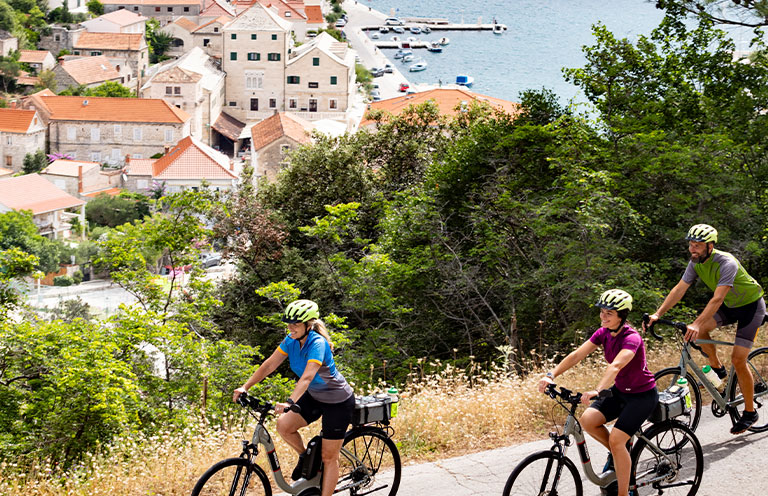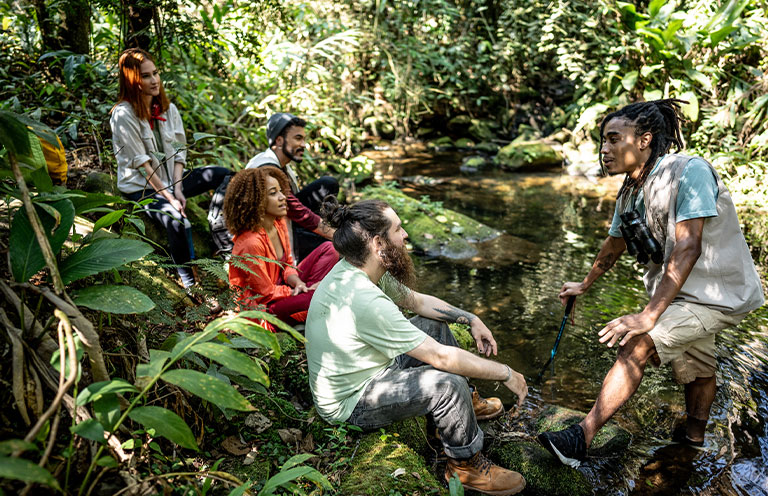
It’s a common misconception that eco-friendly travel means sacrificing quality—or even “roughing it.” But in reality, many top travel providers have adopted earth-friendly policies that help make the journey even more enjoyable by allowing guests to forge deeper connections with diverse places and peoples. Here’s how to elevate your travels while doing your part to preserve our planet.

1. Choose eco-friendly hotel, tour, and cruise lines.
When booking accommodations or tours, opt for businesses committed to sustainability. AAA partners like Hyatt and Hilton have acquired green certifications for energy efficiency and waste reduction. Meanwhile, Royal Caribbean is leading the cruise industry with cleaner fuel technology and marine conservation partnerships. Supporting companies with these values encourages the entire travel industry to invest in sustainable solutions.
2. Be mindful of your daily usage habits.
Small adjustments in your daily habits can significantly reduce your environmental impact while traveling. Pack a reusable water bottle and tote bag to cut down on plastic waste, and conserve water by reusing towels and shortening your showers. Hotels like those in Marriott-Bonvoy’s Green Choice program encourage guests to opt out of daily housekeeping, conserving both water and energy. These mindful habits add up, contributing to a cleaner, more sustainable travel experience.
3. Use public transportation and other sustainable transport where available.
Did you know that AAA partners like Hertz offer discounts on hybrid and electric rental cars to help you ride in eco-friendly luxury? If your travels don’t call for renting a vehicle, you can also take advantage of public transportation or explore destinations on foot or by bike to further minimize your carbon footprint.
4. Explore the destination with responsible tour groups.
Booking with respected ecotour providers like Micato Safaris and Grand Canyon Railways is a great way to support wildlife conservation while giving back to the local economy. Whether you’re hiking the Appalachian Trail or snorkeling Hawaii’s crystalline waters, you can be sure your travel dollars support the people working hardest to protect and preserve these places.
5. Pack light.
The heavier your luggage, the more fuel planes, cars, and buses consume to transport it. By packing lighter, you can help lower carbon emissions. Consider clothing that can be easily layered and washed between wears, and avoid bringing unnecessary items to lighten the load. Beyond supporting environmental preservation, traveling light will help make your journey more comfortable and stress-free.

6. Get involved with local conservation initiatives.
Organizations like The Nature Conservancy maintain offices all over the world, partnering with travel providers like AAA to offer unique opportunities to give back while learning about the natural environment. Consider joining a local beach cleanup or tree-planting project to make your next vacation even more memorable.
7. Opt into carbon emissions when booking flights.
Most major air carriers now offer carbon offset programs, which are available with a simple click at your time of booking. These options allow travelers to balance the environmental impact of their trips by funding projects like reforestation, renewable energy, and other global areas of conservation focus.
8. Dine local.
It’s a little known fact that supporting local, independent restaurants can go a long way to minimize your carbon footprint. Farm-to-table dining experiences reduce the need for long transportation routes, and choosing plant-based meals or those sourced from local farms helps cut down on environmental impact. Many eco-friendly hotels and tour operators also partner with local suppliers to offer sustainable dining options to their guests.
9. Travel during shoulder and off-peak seasons.
Over-tourism can lead to overcrowding, excessive waste, and resource depletion. That’s why many popular destinations offer deep discounts for guests traveling during shoulder season (the time between high and low season) and off-peak periods. In addition to helping reduce environmental strain, it’s a great way to enjoy the destination without the stress of summer crowds and traffic.
Eco-friendly travel isn’t about giving up comfort or adventure; it’s about making mindful choices that benefit you and the planet. Make your next vacation count, and enjoy the journey with confidence and peace of mind for a greener tomorrow.

